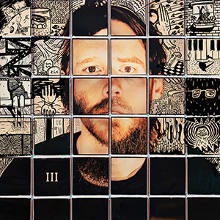The Graham Album Review #1992

Click on CD Cover for Audio Review in streaming mp3 format | |
Bad Books: III
by George Graham
(Loma Vista Records as broadcast on WVIA-FM 7/24/2019)

Click on CD Cover for Audio Review in streaming mp3 format | |
Bad Books: III
by George Graham
(Loma Vista Records as broadcast on WVIA-FM 7/24/2019)
The alternative and indie rock scenes of recent years have added their own imprints to more venerable genres in rock, blues, soul and even folk. Mumford & Sons, and the Avett Brothers are notable examples of alternative folk-influenced bands. This week, we have another group, who have released a worthwhile album, after a period of inactivity as a band. They call themselves Bad Books, and their new recording bears the Roman number III as its title.
Bad Books was originally formed in 2010, and was basically a side project for its members, Brooklyn-based singer-songwriter Kevin Devine, and members Andy Hull and Robert McDowell of the Atlanta-based indie rock band the Manchester Orchestra. They released their first album together in 2010 and then followed it up in 2012 with Bad Books II. After that, Manchester Orchestra resumed and Devine pursued his solo career, putting out five full-length albums since then. But seven years after the last Bad Books album, Hull and Devine have reunited, again bringing along McDowell of the Manchester Orchestra for this project.
The trio create acoustic-dominated music with frequent interesting sonic touches, and vocal harmonies with an indie-rock texture. The result is an engaging album with a kind of cross-generational quality, with songs that can evoke the folkie singer-songwriter ethos but with a bit of edginess. The trio provide all the instrumentation, which is generally rather sparse, with no drums but not without interesting touches with keyboards and sometimes spacey sonic textures. The lyrics are one of the most interesting parts of the record, with the songs described as “love-lorn, but the words are poetically astute, and sometimes offer some social observations, and at others capable of being interpreted by the listener perhaps to one’s own circumstances. Devine and Hull take turns on the lead vocals,
The album opens with a song that exemplifies the gentle but astute music of Bad Books, Wheel Well. The group keeps it generally folky, but add some of their interesting musical textures. <<>>
UFO is another creative piece that brings together the group’s combination of acoustic folk influence, and distinctive metaphoric lyrics in a more electric setting. <<>>
A more obvious love song in its lyrics, is Lake House. But true to form for the band, it takes a little detour. <<>>
Bad Books puts a love-song into a contemporary setting in a composition with the unwieldy title I Love You, I’m Sorry, Please Help Me, Thank You. <<>>
One of the most striking tracks on the album is Neighborhood, performed mostly solo, which takes on the subject of the group-think of hate infecting the neighborhood in the song. <<>>
The album also considers the weighty subject of mortality and religious faith on the piece called Left Your Body. It’s a kind of metaphysical memorial for a relative or friend. <<>>
Also pondering one’s existence and life is Supposed to Be an attractive waltz whose musical setting implies the contradictions alluded to in the lyrics. <<>>
The album ends with its lengthiest and perhaps most lyrically weighty song, Army, which apparently revolves a returning soldier with PTSD. It’s a highlight of the album both musically and in its words. <<>>
The reunion of the side project Bad Books, after seven years, by singer-songwriter Kevin Divine and two of the members of the band Manchester Orchestra, on their album III is an engaging, thoughtful, record representing the best of the indie and alt-folk scene. The style fuses both worlds, with the poetic wordiness of the folkies of the past, but with some of the sonic approach of the indie-rock scene, including the occasionally ethereal sound and arrangements. Though there are no drums to be heard on the album, the sound is much wider-ranging than the acoustic guitars of the traditional style folkies. The vocal harmonies while nicely done, are also for the most part, not in the classic folkie style. The material, presumably by Andy Hull and Kevin Devine, is not credited by composer on the album, so it’s not clear whether they are joint compositions, given the alternating lead vocals. In any case, it’s a well-crafted album that stands up to repeated listening.
Our grade for audio quality is an B-plus. The sound is generally clean, which extends to the vocals. Studio effects are used tastefully to give an atmospheric sound at times without muddying things up, or trying to be trendy. But the dynamic range, as is so often the case, was impaired by volume compression.
The indie folk scene has produced some interesting music in recent years, some of which has achieved a degree of commercial success. Bad Books are another bright light in the genre.
(c) Copyright 2019 George D. Graham. All rights reserved.
This review may not be copied to another Web site without written permission.
 To Index of Album Reviews | To George Graham's Home Page. | What's New on This Site.
To Index of Album Reviews | To George Graham's Home Page. | What's New on This Site.